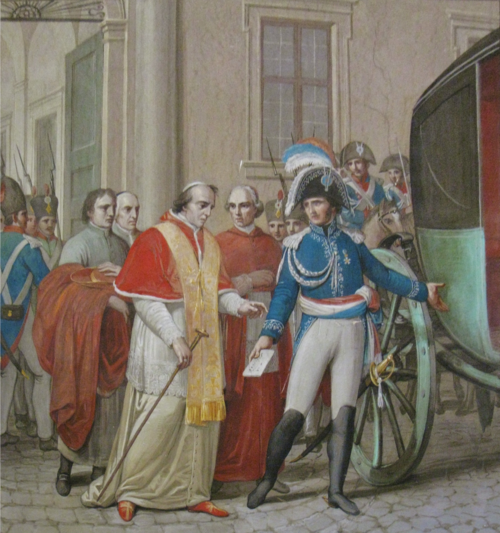
July 6, 1809, is a significant date in the history of the Catholic Church. On this day, Pope Pius VII was kidnapped by General Radet, acting on the orders of Napoleon Bonaparte. This dramatic event occurred due to the pontiff's categorical refusal to adhere to the Continental Blockade imposed by the French Emperor.
The Continental Blockade was a measure implemented by Napoleon to weaken the British economy by prohibiting trade with the United Kingdom and its allies. The aim of this policy was to deprive Britain of the resources necessary for its functioning and thus force it to negotiate peace with France.
However, Pope Pius VII found himself faced with a moral dilemma. As the head of the Catholic Church, he was aware of the detrimental consequences that this decision would have on Catholics living in the territories affected by the Continental Blockade. Furthermore, he believed that the Church should remain neutral in political and economic conflicts.
Faced with the pope's intransigence, Napoleon decided to take radical action. He ordered his general, Radet, to travel to Rome and arrest Pius VII. On July 6, 1809, French troops breached the walls of the Vatican and captured the Holy Father.
The kidnapping of Pope Pius VII caused shockwaves in the Catholic world. Many believers were deeply shocked by this act of violence against the spiritual leader of their Church. Reactions were strong, and international condemnation was unanimous.
The pope was taken into captivity in France, where he remained for several years, deprived of his freedom and subjected to harsh living conditions. Despite this, Pius VII refused to succumb to Napoleon's pressure and maintained his position firmly.
It was only in 1814, with the fall of the French Empire, that Pope Pius VII finally regained his freedom. He was able to return to Rome, where he continued his pontificate until his death in 1823. His courage and resistance in the face of Napoleon's oppression made him an emblematic figure in the struggle for religious freedom.
Today, the kidnapping of Pope Pius VII in 1809 is considered a dark moment in the history of relations between the Church and the State. This event highlights the complexity of the relationship between political and religious power, as well as the importance of freedom of conscience and the separation of powers.
The captivity of Pope Pius VII remains a poignant reminder of the challenges faced by religious leaders in upholding their beliefs and principles in the face of political pressure. His unwavering stance serves as an inspiration and a testament to the enduring power of faith and resilience.
RickMorais, CC BY-SA 3.0, https://fr.wikipedia.org/wiki/%C3%89tienne_Radet#/media/Fichier:Pie_VII_Arrestation_par_le_G%C3%A9n%C3%A9ral_Radet.png


0 comments: